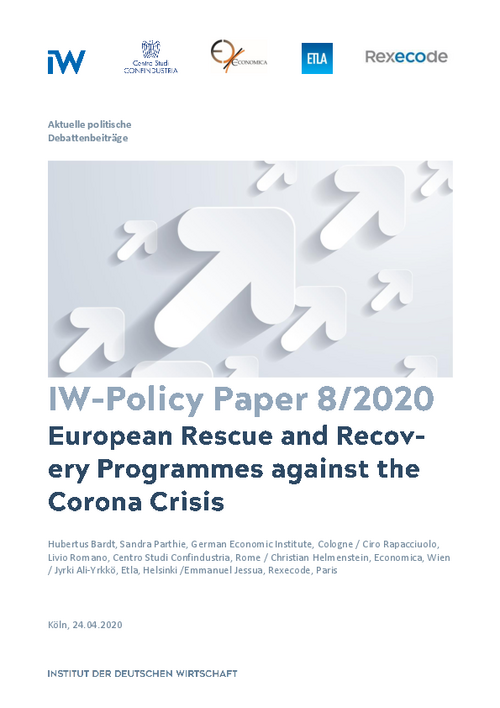The current crisis is different from the situation 2008/2009, but again it is a tremendous challenge for the economies across Europe. The Corona-crisis is hitting the economies symmetrically, though with differences in magnitude levels, while the 2009 crisis was primarily a crisis of the banking industry and the manufacturing sector.

European Rescue and Recovery Programmes Against the Corona Crisis

The current crisis is different from the situation 2008/2009, but again it is a tremendous challenge for the economies across Europe. The Corona-crisis is hitting the economies symmetrically, though with differences in magnitude levels, while the 2009 crisis was primarily a crisis of the banking industry and the manufacturing sector.
This time, value chains are substantially affected. As the virus does not hit all countries at the same time, there will be distortions in the value chains over the next months.
The assessments on the impact on national GDPs range from a best-case scenario -5% for Germany to a worst-case scenario of -12% for Italy.
To deal with the impact of the crisis a European rescue programme is needed immediately, including bringing down infection rates and providing sufficient medical equipment and services.
Regarding the economic support, the comprehensive efforts by the ECB and the Commission, including loosening the rules concerning state aid and the provision in the context of the SURE programme for short time work are very welcome.
In a second phase, Europe will need a common recovery programme fostering economic development and coming back to sustainable growth quickly. Europe must secure open borders for goods, services and labour, which are crucial for the maintenance of the single market and for restarting cross-European value chains. Europe needs a large-scale and timely initiative to foster growth through public and private investments, focusing on health, technology, and the green economy.
The Green Deal should play a key role for the design of the economic recovery programme. The 1.5 trillion euro plan foreseen by the Commission is appropriate to address the challenge faced by European economies. However, to avoid asymmetric rebounds within the EU after the emergency, the European recovery plan must be implemented soon and in a coordinated fashion.

European Rescue and Recovery Programmes Against the Corona Crisis

More on the topic
Not so Different?: Dependency of the German and Italian Industry on China Intermediate Inputs
On average the German and Italian industry display a very similar intermediate input dependence on China, whether accounting for domestic inputs or not.
IW
China’s Trade Surplus – Implications for the World and for Europe
China’s merchandise trade surplus has reached an all-time high and is likely to rise further. A key driver appears to be a policy push to further bolster Chinese domestic manufacturing production, implying the danger of significant overcapacities.
IW